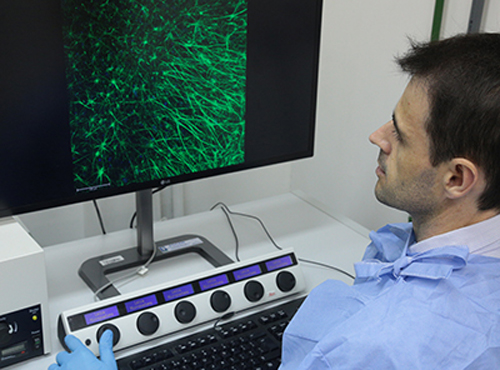Exercise-induced hormone can lessen the damages of Alzheimer's disease
31/01/2019
Lucas Rocha (IOC/Fiocruz)
A hormone released by muscles during exercise can be the key to revert memory loss caused by Alzheimer's disease. This neurodegenerative disease has no cure and leads to the progressive impairment of a person's activities and to a wide range of neuropsychiatric symptoms and behavioral changes. Mouse studies showed that irisin improves neuron communication, preserving synapses. The hormone also prevents toxins that cause neurodegenerative changes, leading to disease onset, from binding to neurons. "We found that irisin also promotes chemical changes within neurons that protect the brain against losing its capacity to store information and it also helps restore memory that has been lost with disease progression", said Oswaldo Cruz Institute (IOC/Fiocruz) researcher Rudimar Luiz Frozza, one of the study's authors. The research led by Fernanda De Felice and Sérgio Ferreira, from Rio de Janeiro Federal University (UFRJ), counts on the participation of other Brazilian institutions, in addition to Canadian and United States scientists. The findings were published on Nature Medicine.

The researchers intend to deepen the study of the mechanisms that trigger the beneficial effects of irisine on the processes of memory and the functioning of nerve cells (Photo: Josué Damacena)
Since irisin was discovered in 2012 by a research group in the United States, several studies have been performed to understand the effect of the hormone on the metabolic changes occurred in type 2 diabetes and obesity. However, its effects on the brain had not been studied yet. The researchers responsible for recent findings have been trying to understand the mechanisms involved in Alzheimer's disease for over a decade. "We became interested in researching how irisin works based on our previous knowledge that relates diabetes and Alzheimer's. Therefore, we asked ourselves whether irisin, acting as a chemical messenger of physical exercising, could have any beneficial effect on the symptoms of memory loss observed in Alzheimer's disease", explained Frozza.
At first, researchers found out that Alzheimer's patients have reduced irisin levels on the brain. To understand the effects of this hormone on how neurons work and on memory changes, they used experimental models with genetically modified mice that had symptoms similar to that of Alzheimer's disease. IOC Thymus Research Lab neuroscientist Rudimar Frozza was one of the researchers who created the physical exercise protocol for the animals, designed to induce irisin production. The protocol included a one-hour swimming session per day, for five days a week, during five weeks. Hormone replacement was achieved with the administration of lab-produced doses and the injection of a virus that increases hormone production. Animals were evaluated with tests that are widely used in memory and learning research.
Tests
In the first test, mice were placed in a box and exposed to two objects that could be explored freely. Then, mice were removed from the box and one of the objects was replaced. Subsequently, mice were returned to the box to explore the objects. "We measured memory loss according to the time mice spent exploring the old and the new object. While the animals that were not administered irisin spent more time exploring the old object, because they could not remember they already knew it, the animals treated with the hormone or that had exercised recovered their capacity to remember like normal mice", explained Frozza.
In another test, mice were placed in a water maze-like structure, where they were supposed to find a platform where they could stand on, sparing them from the strain of swimming. The platform was hidden and visual clues helped them find the way. After some training, normal mice, with no Alzheimer's disease, were able to remember the way. However, animals with the disease took much longer to find the platform and, many times, did not find it at all. Frozza said that when those mice were treated with irisin (or had its production increased with exercising), they were able to remember the way and easily find the platform, indicating that memory loss had been reversed.
The third test is called context-conditioned fear: animals were placed in a box where they were given a slight shock and then were removed from the box. After a period of 24 hours, mice were placed in the box again. Those that remembered the shock, remained still (fearful) for longer, while those with Alzheimer's disease did not have this behavior. In this test, mice treated with irisin or that had exercised before were able to retain memory like normal mice. "All tests provide evidence that supports the effect of irisin, a hormone produced by muscles in response to physical exercise, in preventing memory loss and recovering lost memory. The next step is to more effectively understand how irisin works on the brain. We have to find out more details about how this hormone triggers its beneficial effects on memory processes and nerve cells", he concluded.


